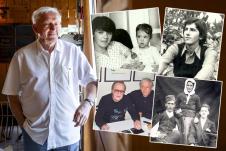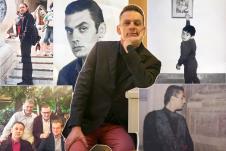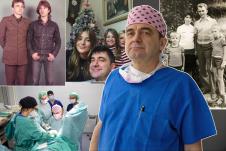‘I'VE WORKED ON MORE THAN 60 FILMS AND TV SERIES’ Life story of Zoran Janković: ‘I started at RTS, continued with Kusturica...’
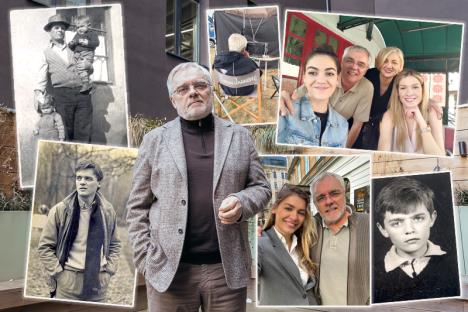
He hails from a farming family in Belgrade. He spent his life and career in television and film. Behind him are Happy People, Family Treasure, Dollars Are Coming, White Ship, Barking at the Stars, Underground, and much more. He has overseen the production of over 400 shows. He has worked with Šotra, Pavić, Vitezović...
The first image I remember in my life is the courtyard of our house in Žarkovo, which no longer exists today. I grew up and lived there until I was 30. And then they demolished it for the street's expansion. Later, my father built a new house in the same area. Why am I telling you all this? It's important to me. We are the sixth generation living in that locality. Both on my father's and mother's side.
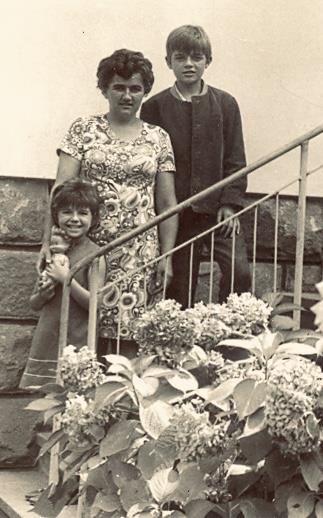
I was born on September 10, 1957, to father Milutin and mother Marija; all my relatives were born in Belgrade. However, Žarkovo was one of the city's municipalities at that time. Čukarica and Banovo Brdo did not exist back then. Žarkovo was the village nearest to Belgrade, and its residents were mostly engaged in agriculture until the end of the eighties.
Family Origins
Both my grandfather and grandmother were farmers, and my father was also for a period, as long as it was economically viable. I proudly say that I come from a farming family.
Our roots are from Montenegro. We come from a certain Krš Janković. My cousin was involved in researching our family's roots. They even have two theories about how we came from Montenegro to Žarkovo.
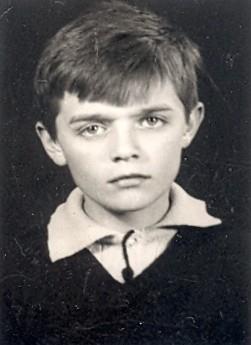
How I Got My Name
Interestingly, for example, my mother wanted me to be named Aleksa. My great-grandfather was named Aleksa... My mother told that story many times. She said to my father: "I would like him to be named Aleksa. He died in 1941..." However, at that time, and on the day of my baptism, they organized a celebratory lunch, and the godfather chose the name. At the time of my birth, the popular names were Zoran and Dragan. And my godfather pulled out a slip of paper and said, "We'll name the boy Zoran." My mother was disappointed. I also prefer the name Aleksa, also because that was my great-grandfather's name. My father had two brothers, or rather, my grandfather had three sons, and I was the youngest male descendant of them all. My mother somehow thought it natural for me to be named after my great-grandfather.
Tradition
We were a family that lived in accordance with all Orthodox customs during communism. Christmas was our biggest holiday, then Easter and our family patron saint's day, St. George's Day. I remember my childhood by these celebrations. Our house was always full during these holidays.
Education
I had problems in school. I started writing with my left hand, and the teacher forced me to write with my right. I had trauma because of that. I am left-handed and left-footed. And to this day, I can write with both hands.
I lived close to school, and I still hang out with some people from elementary school. We’ve remained friends, we see each other, and we socialize as much as we can.
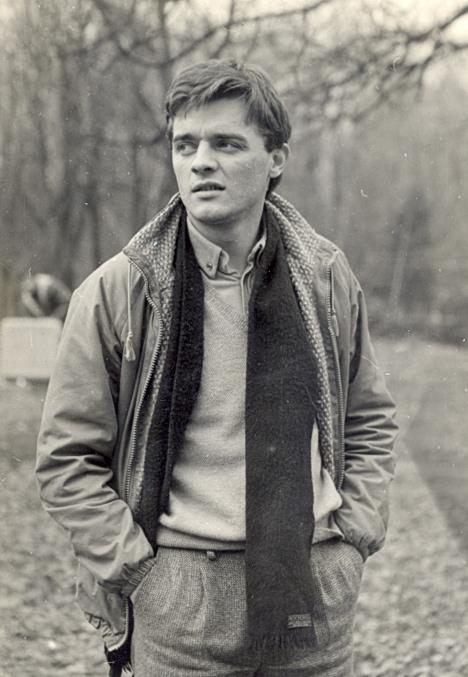
Television
I ended up in television by accident. After finishing the high school of electrical engineering, I enrolled in college, and I just wanted to go to the seaside with my friends and got permission from my parents. However, we didn't have enough money, so I started working on television through a student agency. I came to earn money for my first vacation but ended up staying there for life.
Film
Like all kids in the neighbourhood, we loved to go to Košutnjak. And one of the favourite locations there, besides the sports fields, was the Film City. At that time, a location for shooting some American Western movie was built there. I spent summers mostly on those locations with all my classmates. And I didn't sense it at the time, I mean, that I loved that world. I fell in love with film and its magic. And the first movie I watched in Žarkovo was a Western. I don't remember the title.
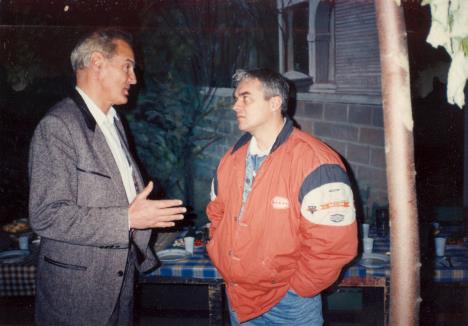
First TV series
I worked at Radio-Television Serbia from 1980 to 1994. I went through all the steps, from organizer to director, and I oversaw the production of over 400 shows (weekly and music magazines, variety shows), and produced several drama series. Interestingly, just before my departure and in the worst of times, I got to work on the series Happy People. And that's where my collaboration with Siniša Pavić started. And from that day on, I worked on all of his drama series. Those were crazy years. When the honorariums were paid, we would give the actors and crew a day off to cash their checks because they would lose their value by the next day..
Siniša Pavić
I remember that there was a very good atmosphere on the sets of all of Siniša Pavić's series. Among the actors, authors, and film workers. I always tried to get people who knew and could endure long shoots. All of his series lasted, and he is one, I’d like to point out, of our greatest TV authors
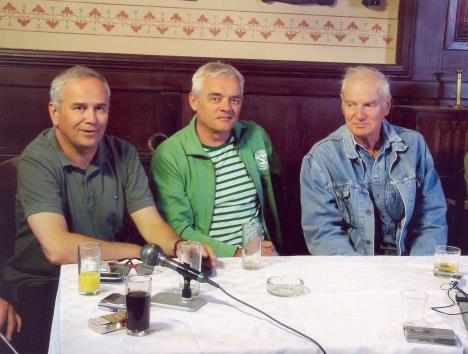
When it comes to Srećni ljudi, it was the first time that some actors left the series. Tanja Bošković and Dubravka Mijatović walked out of the shooting, and Dubravka's reason was the salary. She got an offer to act in a play for more money. And Tanja? She simply decided to support her
Kusturica
I left RTS in 1994 because I received an invitation from Emir Kusturica's team to work on Underground. For the next ten years, I worked in Komuna with Maksa Ćatović. Underground was perhaps the biggest film I worked on. They filmed in the Czech Republic, and then Emir decided to move to Serbia, to Belgrade, when I joined. Essentially, they only worked on some basements in the Czech Republic. It was the largest production ever made here. In terms of scale and production size, it can only be compared to Children of Kozara, which I had worked on with Zafranović. For Kusta, we had to build seven or eight huge structures; it was done the way things are done worldwide, but it also required funding. There was support from French and German producers who financed it. Miljan Kreković Kreka built over 40,000 square meters. The filming ended in Plovdiv, Bulgaria. It was a huge production, and a big success at Cannes, and in my opinion, it's Kusturica's best film.
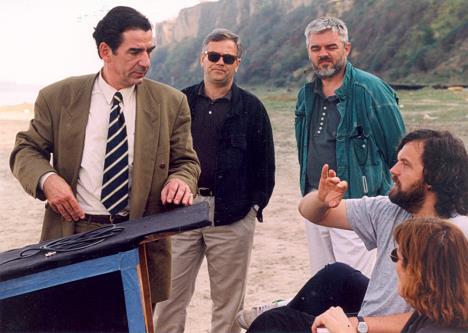
Family Treasure
After that, I stayed in Komuna and I met Sloba Terzić, with whom I'm friends and closest collaborator even today, for over 30 years. Emir finished shooting, and I said, let's come up with something to do, and I invited Siniša Pavić. He started writing Family Treasure, whose working title was A Better Past. He had an agreement with RTS, but they wouldn’t sign the contract. I suggested that he sign a contract with Komuna and that we sell the series to RTS later. That was the first series that an external production company did for them. Today, that's the business model. Siniša wasn't optimistic. He thought Milovan Vitezović, who was Editor-in-Chief at the time, wouldn't accept it. However, I was persistent and believed that it was the future of television. Siniša signed the contract with us and wrote it, and we offered it to RTS, and we made a series that is still frequently rerun.
Siniša Pavić's series mostly have two words in the title – Happy People, Family Treasure, White Ship... Only Heroes of Our Time has three words in the title.
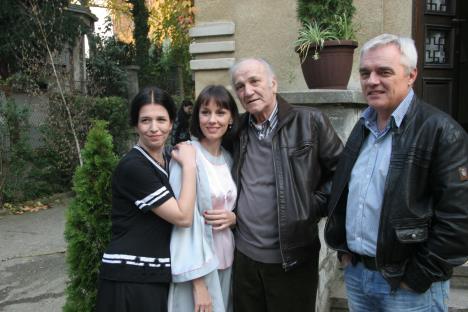
Zdravko Šotra
I had great success working with Šotra. Milovan Vitezović and he had a great text, Barking At The Stars. At that time, I was also working with Kusturica on the film Black Cat, White Cat. Kusta is our greatest director. He tackles big themes. That's why his shoots take a long time, but we finished Barking in 28 days of shooting. And their distribution in cinemas was roughly parallel. Both films achieved similar results. I think - a little over 600,000 viewers. However, Barking became a generational story. Vitezović is a great writer. Later, we did Professor Kosta Vujic's Hat, which is the same story, only from the late 19th century, about the best generation of students of that time. And it was actually a prequel to Barking. Stories about love and growing up, but from a different time.
Košutnjak Film
We did a lot during my ten years at Komuna, and then in 2005, I founded Košutnjak Film. I invited Siniša Pavić and suggested that we do something new, and he told me he had a series with the characters from A Tight Spot. The series White Ship was called The Party of Common Sense. Pantić and Šojić were his characters, and the story had six seasons and 90 episodes in the end. I'm sure we could have been filming it for another 20 years. However, Lane left the series, and I think he made a mistake.
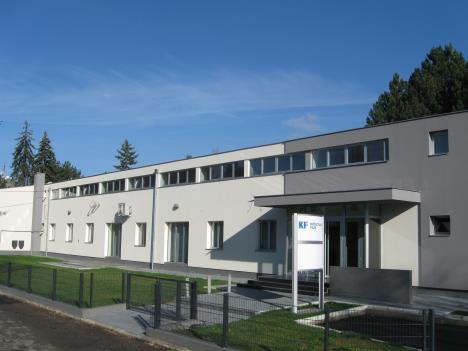
Mir Jam
My vacation is to blame for the new collaboration with Šotra. In 2005, I was with my family on vacation in Corfu, and then I had the opportunity to see for the first time all those places where our army was and all those monuments that the Greeks maintain and preserve today. I heard part of those stories for the first time. Full of impressions, I called Sloba Terzić, and then we called Vitezović and Šotra to make the series Where the Lemon Trees Bloom. I wanted to create something like we see on the History Channel. In that series, Ivan Bosiljčić appeared for the first time, and shortly after, he got a role in the series The Wounded Eagle. Šotra brought me that script, and we signed a contract without me reading it. It sat at RTS for months because they didn't want to film it. However, Aleksandar Tijanić did want to; he was the general director at the time and had a good sense of what would be popular. We set a record that will hardly be broken. The rating for the last episode was 40.2, with a share of 73 percent. I don't know what event could repeat that. Twelve days after the premiere, the series was rerun at the audience's request. After that, we filmed Her Mother's Sin and The Invincible Heart together. The Wounded Eagle was the first series to air every day. It had 17 episodes. Good actors, and everything was well done...

Boba and Boske
Since I mentioned Sloboda Mićalović and Ivan Bosiljčić, let me tell you this too: we paired them in the film Lilacs, directed by Siniša Cvetić and written by David Jakovljević, which will premiere at FEST. Before that, we worked together on Cutting, and Lilacs was a film commissioned by me. Boba and Boske didn't even know that the main roles were written for them. They got them before the script was written. I won't turn that story into a series because everyone does that nowadays.

Career
In 40 years, I have worked on more than 30 films and 30 series. Our country is small, but we have a rich cinema industry. The pinnacle of my career will probably be Lordan Zafranović's Children of Kozara. Many producers failed to negotiate and shoot that film and series, but Željko Joksimović succeeded. He brought the project to a stage where it could be realized. After talking to Lordan and him, I accepted to work on it, although I hadn't planned to. Željko and I are very good friends; we've known each other for the last 30 years, and we met in 1996 at the first Budva Festival. He did the music for my series. I felt it was my duty; I believed that we all had an obligation to make that film finally happen. And I'm very glad I participated in it.

Last year in January, we started the preparations, and by September 1st, we finished filming according to plan. We managed to accomplish everything just as I had envisioned, despite facing many challenges. I believe this will be a significant film and an eight-episode series, and it may turn out to be Lordan's best film yet. I told him this when we watched the footage. The film is currently in post-production, and I hope it will be completed by autumn. The plan is to submit it to the Venice Film Festival, but it's still too early to talk about it as everything is still in the processing phase. This is the most challenging part of the job.
Family
I have two wonderful daughters, Katarina, Ralević, and Isidora, whom I had with my ex-wife Jasna, who was a costume designer. We met in television and worked together on many series and films. It was expected that our girls would be interested in the arts. From a young age, Katarina showed a talent for writing. She graduated from the Faculty of Dramatic Arts in Belgrade and is now a screenwriter and creative director at Košutnjak film. She created the excellent sitcom The Case of the Bošković Family and is working on something new.
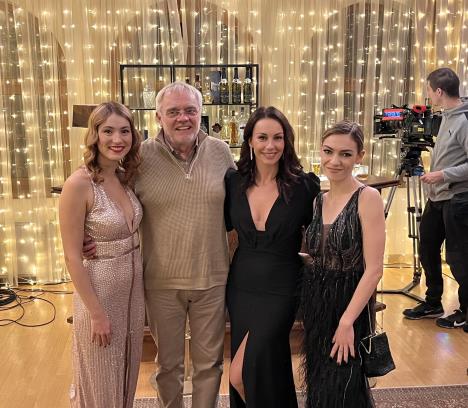
Isidora, the younger one, is an actress. Lordan tells me she delivered a brilliant performance in the film Children of Kozara. She started acting as a child, at the age of 12, when she got a role in the series Professor Kosta Vujić's Hat. While attending the Dadov School of Acting, in 2013, she played Alice in the film No One's Child, directed by Vuk Ršumović and won an award at the 50th Film Encounters in Niš for outstanding acting. She also had the opportunity to attend the Venice Film Festival with the film's team and her colleague Denis Murić, where the film received three awards.
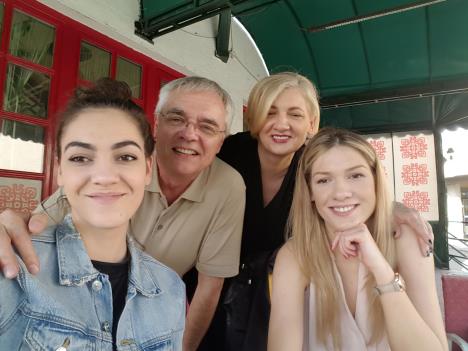
I made sure to always stay on the sidelines when it came to Katarina and Isidora, and I think I’ve succeeded. I've also become a grandfather. There's no greater joy. Katarina gave birth to my grandson Nikša. He’s changed all of our lives.
My Homeland
I've filmed more than 60 movies and series, but one story holds a special place in my heart, and that's the documentary about Žarkovo. The film is called Žarkovo, a Story That Endures. We created a book and DVD edition to preserve the memory of our homeland and the people who are no longer with us.
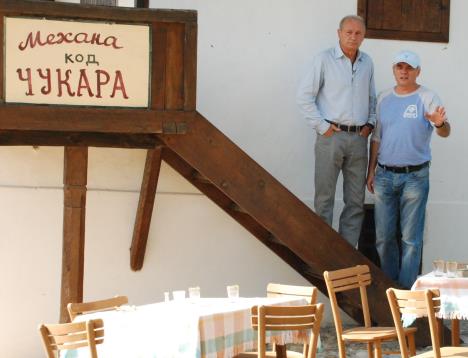
Our local elementary school was built in 1840. Stojan Čola was its first teacher, and there were 13 students enrolled. The school operated for years until the 1980s, when it was abandoned and declared a protected monument by the Institute for the Protection of Cultural Monuments. However, it deteriorated over the years and was completely neglected in every aspect. A few years ago, I came up with the idea of establishing the Žarkovo Local Museum. I went to the head of the municipality and said, "Look, I would like us to renovate it, restore it, and turn it into a museum." "I have no money," he said, and that was the only thing I didn't ask for. Then Miloš Spasenović, who owns the company Gramis, got involved, followed by the city administration, and finally Jelena Medaković, Director of the Belgrade City Museum, joined in. I presented her with the idea, we started the reconstruction, and today the museum is open. The Žarkovo Local Museum operates within the Belgrade City Museum.
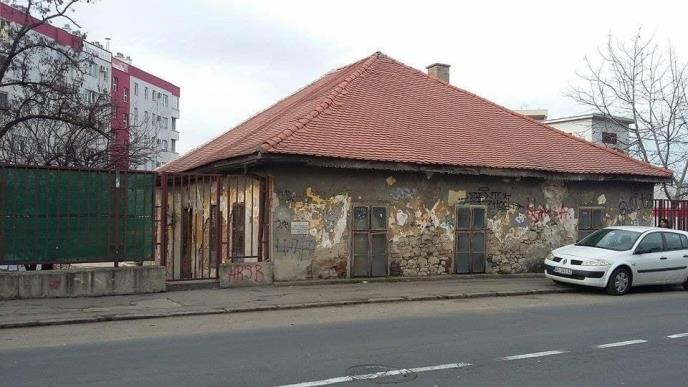
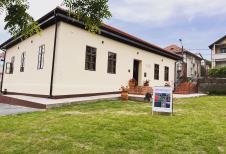
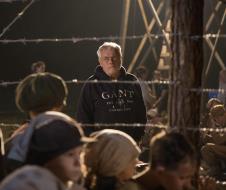
What must be one
You have to believe in what you do. Maybe I could have done more in life, or maybe less. That's a relative question now. But I am very satisfied with what I have done because I consider it, in fact, my measure, in every respect. And behind that, there must be work. Work, work, and more work. Because work drives everything. I would like to be remembered for those things, as someone who adhered to his principles - that everything was on time, that it was fair, that it was within the agreed framework, and that everything was respected within the realm of possibility.
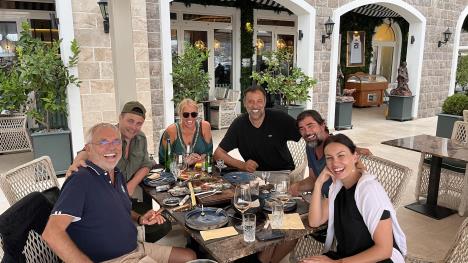
How I will be remembered
I'm not afraid of death. As for the future and how people will see and remember me one day, for me, it's both difficult and easy to answer. It's more complex, not a simple answer. There are works left by which people will remember me. And in the film industry, when my name is mentioned, from what I hear, I am considered a man who has kept his word, who has had no debts, and who has believed in what he was doing. That's why those projects, among other things, were successful.
Bonus video:


